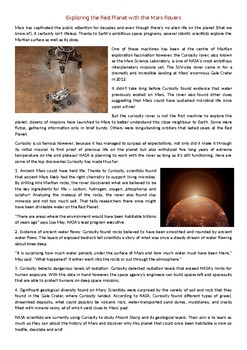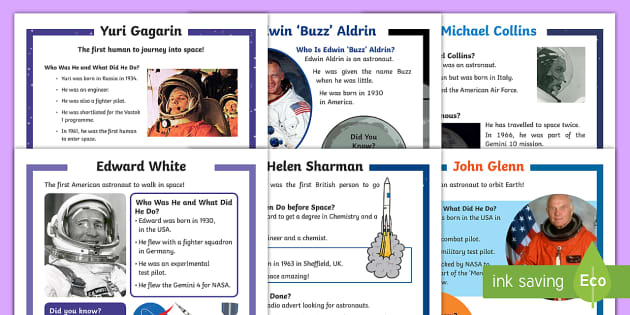Imagine a young child, gazing up at the night sky, their eyes wide with wonder. They point at a twinkling star and ask, “Mommy, what’s out there?” That simple question, brimming with innocent curiosity, encapsulates the very essence of our human drive to explore the universe. But how can we, as a species, nurture that thirst for knowledge and ensure future generations have the tools to understand the vast complexities of the cosmos? This is where the concept of “extended reading comprehension” in space exploration comes in, and it’s a journey that requires not only scientific breakthroughs but also significant investments in education.

Image: www.teacherspayteachers.com
We all know the iconic image: astronauts floating in zero gravity, conducting groundbreaking experiments. But beneath those awe-inspiring visuals, there’s a fundamental need for advanced literacy, far exceeding the ability to simply read and write. Space exploration necessitates a deep understanding of complex scientific concepts, data analysis, and the capacity to interpret vast amounts of information gathered from distant worlds. This is where extended reading comprehension, the ability to critically engage with text, synthesize information from various sources, and apply it to real-world challenges, becomes an essential cornerstone.
The Importance of Extended Reading Comprehension in Space Exploration
To truly appreciate the significance of extended reading comprehension in space exploration, we need to delve deeper into its core principles:
-
Critical Thinking: In the realm of space exploration, facts and figures are just the beginning. We need to be able to analyze those data points, evaluate their validity, draw conclusions, and formulate hypotheses based on the evidence obtained. Extended reading comprehension empowers astronauts and scientists to move beyond simply gathering information and become active participants in deciphering the secrets of the cosmos.
-
Interdisciplinary Knowledge: Space exploration is not a singular field; it’s a tapestry woven from diverse disciplines. Imagine the collaborative efforts of astrophysicists, engineers, geologists, and even historians, each contributing their expertise to unravel the mysteries of an asteroid or design a spacecraft to explore a distant planet. Extended reading comprehension allows individuals to bridge the gap between seemingly disparate fields, fostering effective communication and understanding.
-
Adaptability and Problem-Solving: The unknown is a constant companion in space exploration. From unexpected malfunctions to unforeseen discoveries, astronauts and researchers must be equipped to analyze new information, adapt their strategies, and solve complex problems in dynamic environments. Extended reading comprehension enhances the ability to think critically, identify patterns, and develop innovative solutions under pressure.
Funding Extended Reading Comprehension: Seeds for Future Exploration
Now, let’s look at the practical implications of fostering extended reading comprehension for future generations of space explorers. How can we make this happen?
-
Early Education: The foundation for extended reading comprehension begins with nurturing a love for learning in the very early stages of life. Encouraging young children to explore books, engage in discussions about their surroundings, and question the world around them paves the way for developing critical thinking skills.
-
STEM Education: The acronym STEM (Science, Technology, Engineering, and Mathematics) represents the core pillars of space exploration. Invest in robust STEM education programs, emphasizing hands-on learning, problem-solving, and fostering a scientific curiosity.
-
Science Literacy Initiatives: We need to cultivate a society where science is not just a subject in the classroom but a source of fascination and awe. Public science museums, planetariums, and accessible online resources play a crucial role in sparking an interest in space exploration and promoting a deeper understanding of scientific concepts.
-
Funding Research in Reading Comprehension: The quest for knowledge necessitates constant innovation. Invest in research and development of new tools and strategies to enhance extended reading comprehension, including programs that cater to specific learning styles and adapt to evolving technologies.
The Importance of Diverse Voices and Perspectives
It’s also vital to recognize that fostering a truly inclusive approach to space exploration goes beyond simply funding education. It involves actively promoting diversity in the field, ensuring that individuals from all backgrounds, regardless of race, gender, or socioeconomic status, have access to opportunities and resources. Encouraging the participation of underrepresented groups in STEM disciplines not only enhances inclusivity but also brings a wider range of perspectives and experiences to the table, ultimately enriching the process of scientific discovery.
-
Bridging the Gap: Not every student has equal access to quality education. Investing in initiatives that bridge the gap in educational resources, ensure access to technology, and provide support for underprivileged communities is crucial for building a future where everyone has an opportunity to explore the universe.
-
Mentoring and Collaboration: Establishing robust mentoring programs that pair seasoned scientists and educators with aspiring students can inspire and empower future space explorers. Creating collaborative environments that foster cross-cultural understanding and teamwork can nurture the next generation of pioneers.
Beyond the Stars: The Real-World Impact of Extended Reading Comprehension
The benefits of extended reading comprehension extend far beyond the realms of space exploration. The ability to critically analyze information, synthesize different perspectives, and solve complex problems are skills that are transferable to countless careers and aspects of life.
-
Economic Growth: A workforce equipped with critical thinking and problem-solving skills is a vital asset to any economy. Investments in education and literacy directly contribute to innovation, technological advancements, and economic growth.
-
Global Citizenship: In a world increasingly interconnected, the ability to understand diverse viewpoints, grapple with complex global issues, and engage in respectful discussion is crucial. Extended reading comprehension fosters a sense of global citizenship and empowers us to contribute to a more just and sustainable future.

Image: www.twinkl.co.cr
Extended Reading Comprehension Funding Space Exploration
https://youtube.com/watch?v=NineQXa6jmE
Conclusion
As we gaze upward at the vastness of space, fueled by curiosity and fueled by the desire to understand our place in the universe, let’s remember that the true journey of exploration begins with nurturing the minds of our future generations. Investing in extended reading comprehension, fostering a love for learning, and creating an inclusive and accessible educational environment are crucial steps in unlocking the potential of humanity’s cosmic quest. Let’s embark on this journey together, nurturing the minds that will one day navigate the stars and shape the future of space exploration.






